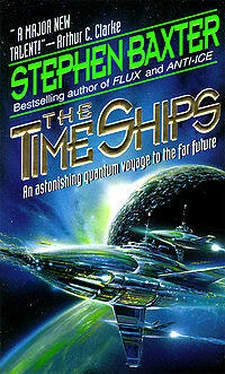She held her hands up. “I understand.”
We emerged from the Sea, and I toweled myself dry with my shirt. Hilary picked up her gun, but we left our boots piled on the beach, and we strolled by the water’s edge. After a few dozen yards I spotted the shallow indentations which betrayed the presence of corbicula — those burrowing bivalves which inhabited that beach in such numbers. We squatted on the sand, and I showed her how to dig out the compact little creatures. Within a few minutes we had built up a respectable haul; a heap of bivalves sat drying in the sun beside us.
As she picked over the bivalves with the fascination of a child, Hilary’s face, with her cropped hair plastered flat by the water, shone with pleasure at her simple achievement. We were quite alone on that beach — we might have been the only two humans in all that Palaeocene world — and I could feel the sparkle of every bead of perspiration on my scalp, the rasp of every grain of sand against my shins. And it was all suffused by the animal warmth of the woman beside me; it was as if the Multiple Worlds through which I had traveled had collapsed down to this single moment of vividness to Here and Now.
I wanted to communicate something of this to Hilary. “You know—”
But she had straightened up, and turned her face to the Sea. “Listen.”
I gazed about, baffled, at the forest’s edge, the lapping Sea, the lofty emptiness of the sky. The only sounds were the rustle of a soft breeze in the forest canopy, and the gentle gurgle of the lapping wavelets. “Listen to what?”
Her expression had become hard and suspicious — the face of the soldier, intelligent and fearful. “Single-engined,” she said, her concentration apparent. “That’s a Daimler-Benz DB — a twelve-cylinder, I think…” She jumped to her feet and pressed her hands to her brow, shielding her eyes.
And then I heard it too, my older ears following hers. It was a distant thrum — like some immense, remote insect — which came drifting to us off the Sea.
“Look,” Hilary said, pointing. “Out there. Can you see it?”
I sighted along Hilary’s arm, and was rewarded with a glimpse of something: a distortion, hanging over the Sea, far to the east. It was a patch of otherness — a whorl no bigger than the full moon, a kind of sparkling refraction tinged with green.
Then I had an impression of something solid in the middle of it all, congealing and spinning — and then there was a hard, dark shape, like a cross, which came hurtling low out of the sky — from the east, from the direction of a Germany yet to be born. That thrumming noise grew much louder.
“My God,” Hilary Bond said. “It is a Messerschmitt — an Eagle; it looks like a Bf 109F…”
“Messerschmitt… That’s a German name,” I said, rather stupidly.
She glanced at me. “Of course it’s a German name. Don’t you understand?”
“What?”
“That’s a German plane. It is die Zeitmaschine, come to hunt us down!”
As it approached the coast, the craft tipped in the air, like a seagull in flight, and began to run parallel to the Sea’s edge. With a noisy whoosh, and so fast that Hilary and I were forced to swivel on the sand to follow its progress, it passed over our heads, not a hundred feet from the ground.
The machine was some thirty feet long, and perhaps a little more from wing-tip to wing-tip. A propeller whirled at its nose, blurred by speed. The craft’s underside was painted blue-gray, and its upper sections were done out in mottled brown and green. Strident black crosses on the fuselages and wings marked the craft’s country of origin, and there were more gaudy militaristic designs on the painted skin, of an eagle’s head, an upraised sword, and so on. The underside was quite smooth, save for the craft’s single load: a tear-drop mass of metal perhaps six feet long, painted in the ubiquitous blue.
For some moments Bond and I stood there, as stunned by this sudden apparition as if by some religious visitation.
The excitable young man buried inside me — the shade of poor, lost Moses — thrilled at the sight of that elegant machine. What an adventure for that pilot! What a glorious view! And what extraordinary courage it must have taken to haul that machine into the smoke-blackened air of 1944 Germany — to take that plane so high that the landscape of the heart of Europe would be reduced to a kind of map, a textured table-top coated with sand and sea and forest, and tiny, doll-like people — and then to close the switch which launched the craft into time. I imagined how the sun would arc over the ship like a meteorite, while beneath the prow, the landscape, made plastic by time, would flow and deform…
Then the gleaming wings tipped again, and the propeller’s noise came crashing down over us. The craft swooped upwards and away, over the forest and in the direction of the Expeditionary Force.
Hilary ran up the beach, and her uneven limping left asymmetric craters in the sand.
“Where are you going?”
She reached her boots, and began to haul them on roughly, ignoring her socks. “To the camp, of course.”
“But…” I stared at our small, pathetic pile of bivalves. “But you can’t outrun that Messerschmitt. What will you do?”
She picked up her hand-gun and stood up straight. For answer, she looked at me, her expression blank. And then she turned and shoved her way through the fringe of palm trees which lined the edge of the forest, and disappeared into the shadows of the dipterocarps.
The noise of the Messerschmitt aircraft was fading, absorbed by the forest canopy. I was alone on the beach, with the bivalves and the lapping of the surf.
It all seemed quite unreal: War, imported to this Palaeocene idyll? I felt no fear — nothing but a sense of bizarre dislocation.
I shook off my immobility, and prepared to follow Bond into the forest.
I had not even reached my boots when a small, liquid voice came floating across the sand to me: “ …No!… go to the water…no!…”
It was Nebogipfel: the Morlock came stumbling across the sand towards me, his improvised crutch digging a series of deep, narrow pits. I saw how a loose edge of his face-mask flapped as he staggered along.
“What is it? Can’t you see what’s happening? Die Zeitmaschine —”
“The water.” He leaned on his crutch, as limp as a rag doll, and his panting tore at his frame. His wheezing had grown so pronounced that his syllables were barely distinguishable. “The water… we must get in the…”
“This is no time for a swim, man!” I bellowed, indignant. “Can’t you see—”
“Do not understand,” he gasped. “You. You do not… Come…”
I turned, abstracted, and looked over the forest. Now I could see the elusive form of die Zeitmaschine as it skimmed over the tree-tops, its green and blue paint making vivid splashes against the foliage. Its speed was extraordinary, and its distant noise was like an insect’s angry buzz.
Then I heard the staccato cough of artillery pieces, and the whistle of shells.
“They’re fighting back,” I said to Nebogipfel, caught up by this spark of War. “Can you see? The flying machine has evidently spotted the Expeditionary Force, but they are firing off their guns at it…”
“The Sea,” Nebogipfel said. He plucked at my arm with fingers as feeble as a baby’s, and it was a gesture of such immediacy, such pleading, that I had to tear my eyes from the aerial battle. The grubby slit-mask exposed mere slivers of his eyes, and his mouth was a down-turned, quivering gash. “It is the only shelter close enough. It might be sufficient…”
Читать дальше
Конец ознакомительного отрывка
Купить книгу









